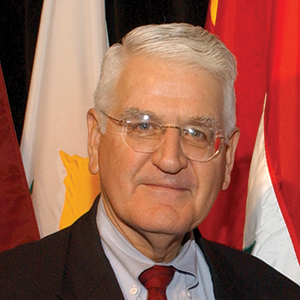Howard M. Snyder III, MD, FACS, a pioneer in pediatric urology and a former American College of Surgeons (ACS) Regent and Governor, passed away June 4 at age 76 from complications of Parkinson’s disease and the coronavirus disease 2019 (COVID-19). Prior to his retirement in 2015, Dr. Snyder was a pediatric urologist in the division of urology at Children’s Hospital of Philadelphia (CHOP), PA, and professor of surgery in urology, Perelman School of Medicine at the University of Pennsylvania. His contributions to the field shaped modern understanding and treatment of many urologic conditions in young patients.
Service to patients and country
Dr. Snyder earned his undergraduate degree from Princeton University, NJ; received his medical education at Harvard Medical School, Boston, MA; and then spent a year in the U.K. learning from experts in pediatric urology. He returned to the U.S. in 1980 and began to practice at CHOP at the recommendation of C. Everett Koop, MD, FACS, then-surgeon-in-chief of the hospital and future Surgeon General of the U.S., and John W. Duckett, MD, FACS, a renowned urologist. He remained there until his retirement in 2015.
In addition to his practice in Philadelphia, Dr. Snyder was proud to follow in his grandfather’s and father’s footsteps by serving in the U.S. armed forces. Dr. Snyder served for more than 20 years in the U.S. Army Medical Corps and was deployed to active duty in 2003 in Operation Iraqi Freedom. He also served as a professor of surgery at the Uniformed Services University of the Health Sciences, Bethesda, MD.
Innovator and leader in pediatric urology
Dr. Snyder’s research and innovation in pediatric urology led to advancements in diverse areas of care, including posterior, prune belly syndrome, ureteroceles, hypospadias, cryptorchidism, management of neuropathic bladder, andrology, and pediatric urologic oncology. Many of his treatments remain the standard of care to this day.
Dr. Snyder was actively involved as a member and leader of many medical societies. An ACS Fellow since 1984, he served as a Governor (2002–2008) and a Regent (2007–2016), chaired the Advisory Council for Urology (2003–2007), and served on several committees. Dr. Snyder also was a member and leader of the American Association of Genitourinary Surgeons; the American Surgical Association; the American Board of Urology, on which he served as a member and examiner; among others. In 2013, he received the American Urological Association’s Urology Medal for contributions to pediatric urology.
Comments from friends and colleagues at the ACS
Dr. Snyder’s undeniable skill as a surgeon and compassionate demeanor found him many friends among his surgical colleagues.
Marshall Z. Schwartz, MD, FACS, FRCSEng(Hon), Past-Vice-Chair, ACS Board of Regents, said, “How do you summarize a 47-year wonderful friendship with someone who was so giving of himself? Howard was a multidimensional person who loved to learn and teach. We first met in 1973, when we were general surgery residents rotating to Boston Children’s Hospital, MA. Our close friendship developed even though we pursued different surgical fields within the pediatric age group—Howard in pediatric urology (he became an international icon) and me in pediatric general surgery. Ironically, in 1996 we ended up in Philadelphia together living less than one mile apart. Howard was already established in Philadelphia, and he and his wife Mimi took us under their wings and exposed us to the arts, local and regional surgical associations, and so on. He had many diverse interests including art, music, old pocket watch collecting, and gourmet cooking, to name a few. We were both excited when we became Regents of the College. We shared a common passion as Regents, which was to improve the visibility of the College within our federal government. We wanted to emphasize the College’s mission of quality surgical care and patient safety and the accomplishments of the College in fulfilling these goals. I will miss him dearly.”
“Howard and I shared an apartment when we were residents at the Brigham [Boston] in the early 1970s,” said Lenworth M. Jacobs, Jr., MD, MPH, FACS, ACS Regent. “It was a pleasure to learn from his wise counsel and thoughtful comments about pretty nearly any subject. We all had a wonderful time with friends from across the entire spectrum. He also was always open to helping others and to lending a hand to those who needed it. He was an excellent surgeon and was superbly trained. He really made a positive impression on the world. I will miss him terribly. Rest in peace.”
James K. Elsey, MD, FACS, ACS Regent, described Dr. Snyder as “a brilliant man, a superb surgeon, and an ACS servant, but, most importantly, he was a warm, caring, compassionate man and my friend. I’ll never forget one night, shortly after I was elected to the Board of Regents, he called me at my home. He wanted to introduce himself as a seasoned member of the Board. He offered to be my mentor in the room to help me get a good start and navigate the complexities of the job. I have never forgotten that act of kindness. What I came to find out during the several years of working with him was that this was his way with everyone, and his avuncular nature permeated all the actions of his life. I will miss him, and I am sure he is getting his just reward.”

